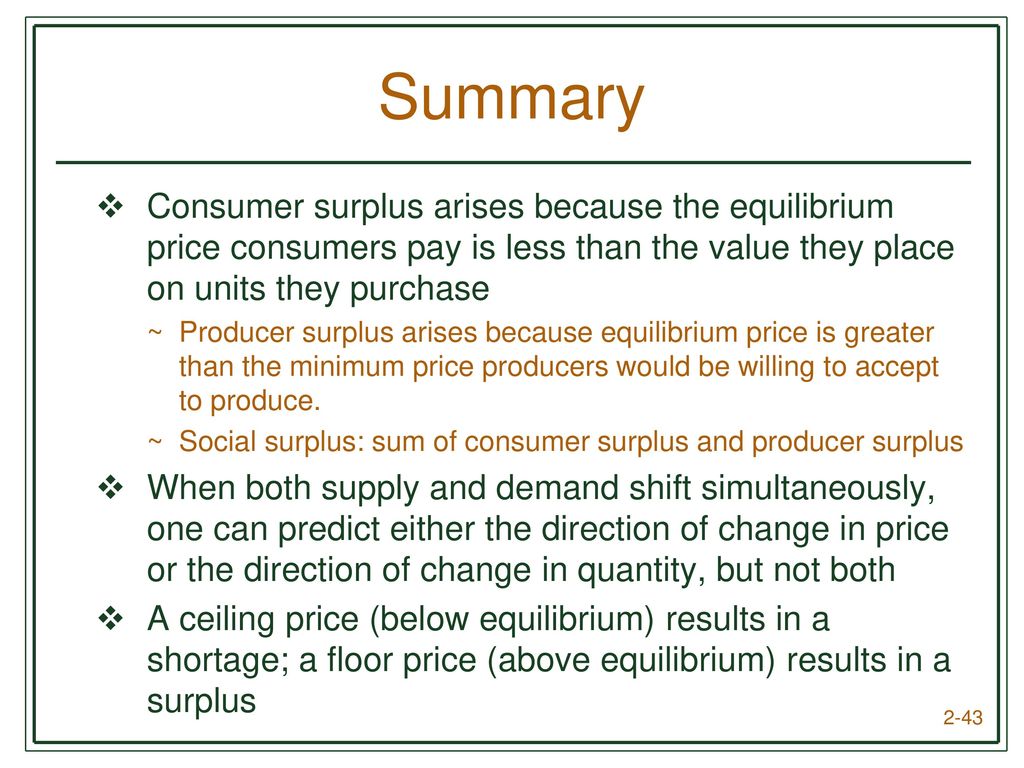Consumer Surplus Arises In A Market Because

Consumer Surplus Arises In A Market Because Study with quizlet and memorize flashcards containing terms like 1. consumer surplus arises in a market because: a. at the market price, quantity supplied is greater than quantity demanded b. at the current market price, quantity demanded is greater than quantity supplied c. some consumers are willing to pay more than the equilibrium price but do not need to do so d. some consumers are willing. Consumer surplus is measured as the area below the downward sloping demand curve, or the amount a consumer is willing to spend for given quantities of a good, and above the actual market price of.

Consumer Surplus Arises In A Market Because вђ Derivbinary Consumer surplus is the difference between the maximum willingness to pay and the actual price for a good or service. it measures the economic benefit and welfare of consumers in a market economy. learn how to calculate consumer surplus and its impact on price elasticity and social welfare. Consumer surplus will only increase as long as the benefit from the lower price exceeds the costs from the resulting shortage. consumer surplus always decreases when a binding price floor is instituted in a market above the equilibrium price. the total economic surplus equals the sum of the consumer and producer surpluses. Suppose a consumer is able and willing to pay $50 for a concert ticket, but the market rate of the ticket is only $30. in this case, the consumer experiences a surplus of $20. this surplus arises because the consumer values the concert experience at $50 but can acquire it for a lower price. Consumer surplus, in economics, the difference between the price a consumer pays for an item and the price he would be willing to pay rather than do without it.as first developed by jules dupuit, french civil engineer and economist, in 1844 and popularized by british economist alfred marshall, the concept depended on the assumption that degrees of consumer satisfaction (utility) are measurable.

Chapter 2 Demand Supply And Market Equilibrium Ppt Download Suppose a consumer is able and willing to pay $50 for a concert ticket, but the market rate of the ticket is only $30. in this case, the consumer experiences a surplus of $20. this surplus arises because the consumer values the concert experience at $50 but can acquire it for a lower price. Consumer surplus, in economics, the difference between the price a consumer pays for an item and the price he would be willing to pay rather than do without it.as first developed by jules dupuit, french civil engineer and economist, in 1844 and popularized by british economist alfred marshall, the concept depended on the assumption that degrees of consumer satisfaction (utility) are measurable. Consumer surplus, also known as buyer’s surplus, is the economic measure of a customer’s excess benefit. it is calculated by analyzing the difference between the consumer’s willingness to pay for a product and the actual price they pay, also known as the equilibrium price. a surplus occurs when the consumer’s willingness to pay for a. Consumer surplus definition: examples of consumer surplus. the positive feeling that you get when you score a great deal is something that economists study and measure using graphs. it’s called consumer surplus, and it’s equal to the difference between the highest price you would be willing to pay for something, and the price that you.

Comments are closed.